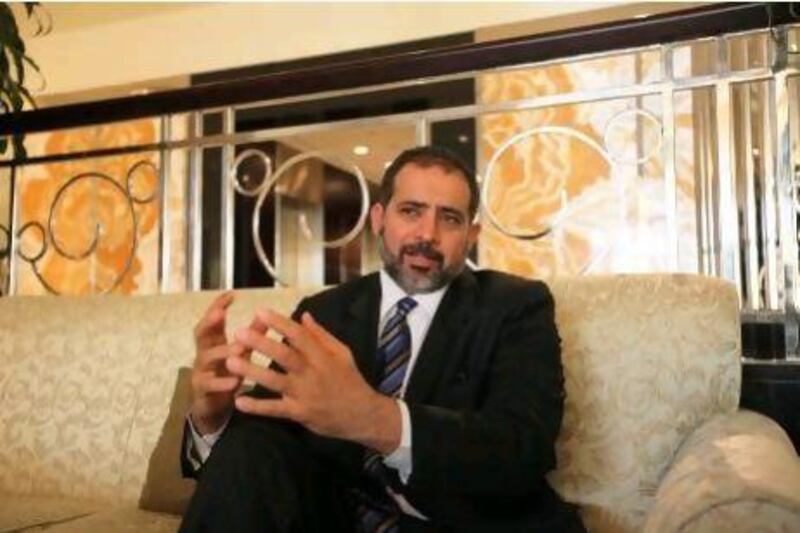ABU DHABI // The former Libyan ambassador to the UAE has described his resignation this week as a gesture to mark a new era for his country.
Dr Aref Nayed, an academic, served as an ambassador voluntarily for a year. He took the post on the understanding that he would quit after elections were held, he said yesterday.
"I agreed on two conditions: first, it would be a volunteer position with no salary; second, I would hand it over to a professional diplomat as soon as things stabilise in [Libya]," Dr Nayed said. "Revolutionary legitimacy ends with elections and the start of state-building."
On Sunday, he and his team handed over administrative matters to a team from Libya's foreign ministry.
"All ambassadors should be appointed by an elected government," Dr Nayed said. "The revolutionary circumstances that led me to this position have now culminated in these amazing elections.
"I had informed our president and government of my resignation at the elections three weeks ago."
He worked from the Libyan consulate in Dubai because the embassy building in the capital was handed to its owner by the ambassador appointed by former president Muammar Qaddafi.
A second building in the capital was run by the Libyan mission but not registered with the UAE Ministry of Foreign Affairs.
Dr Nayed said the staff of the previous ambassador had been given the choice of siding with the people or leaving. Having decided to support the old regime, they were asked by UAE authorities to leave.
In their place, Dr Nayed formed a group of volunteers who helped to rebuild the consular operation from scratch. For their first six months, funding came from private donors.
"Instead of a police-state embassy, we managed to turn the consulate into a community-service centre," he said.
"I was honoured to work with the Libyan community here. They are very patriotic and a dynamic group of highly professional people."
On top of the usual consular duties such as renewing and issuing passports, he co-ordinated with UAE authorities to allow Libyans stuck in the country during the civil war to overstay without penalty.
Dr Nayed, a professor of theology and philosophy who has taught in universities in Canada, the UK, Italy, Libya and Malaysia, took a leading role from the early days of the revolution and was the first to ask the UAE leadership for support against the Qaddafi regime.
He attended a protest in Tripoli on February 19, then convened Muslim scholars in Libya in a "network of free clerics" that issued a fatwa against Qaddafi.
Dr Nayed became the chief operations officer of the voluntary Libyan stabilisation team.
He recalls with pride the moment Dubai's Libyans became the first to vote in almost 50 years, with their polling station opening before all others.
"It was a historic moment," Dr Nayed said. "The election was also a celebration."
He said he used his connections in different countries to rally international support for the uprising.
And Dr Nayed praised the UAE's pivotal role in the uprising, lobbying for international support against Qaddafi.
He said when he explained the situation to Sheikh Abdullah bin Zayed, the UAE Minister for Foreign Affairs, he quickly stepped in to help.
"The country of the late Sheikh Zayed quickly took the right moral stance and sided with the Libyan people," Dr Nayed said.
The UAE assisted Libya in areas including support for refugees, training, and medical and humanitarian relief. It helped to reopen schools and sent educational supplies and materials. It also sent 120 police cars and is training 28 young officers at the Al Ain military academy.
"The Libyan interior ministry has painted all the police cars in red and white," Dr Nayed said. "They have become the symbol of comfort and security."
Now he expects the UAE's support to move to investment in a country with great potential and resources.
"Libya will be an attractive destination for decades to come," Dr Nayed said.
And he believes his country could save time and effort in areas such as ports management and border security by learning from the UAE.
Now Dr Nayed plans to return to the private sector and to his academic and educational projects, including an expansion of his think tank, Kalam Research and Media.






